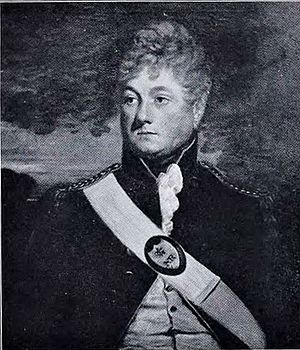Martin Ffolkes facts for kids
Quick facts for kids
Martin Ffolkes
|
|
|---|---|
 |
|
| 1st Baronet | |
| In office 1774–1821 |
|
| Succeeded by | William John Henry Browne ffolkes |
| Member of the British Parliament for King's Lynn |
|
| In office 1790–1821 |
|
| High Sheriff of Norfolk | |
| In office 1783–1784 |
|
| Personal details | |
| Born | 21 May 1749 |
| Died | 11 December 1821 Hillingdon, UK |
| Spouse | Fanny Turner |
| Children | 3 |
| Alma mater | Emmanuel College, Cambridge |
| Occupation | lawyer |
| Military service | |
| Rank |
|
| Unit | Norfolk Rangers |
Sir Martin Browne ffolkes, 1st Baronet (born May 21, 1749 – died December 11, 1821) was an important English figure. He was a Baronet, which is a special title passed down in families, and a Member of Parliament. This means he was elected to help make laws for the country. He was also a FRS, showing he was a respected scientist.
Contents
Early Life and Education
Martin ffolkes was born in 1749. His father, William ffolkes, was a lawyer from Hillington, Norfolk. His mother, Mary, came from a well-known family; her father was Sir William Browne, a famous doctor. Martin also had a famous uncle, Martin Folkes, who was the head of the Royal Society, a group for important scientists.
Martin went to Eton School, a famous school, from 1758 to 1766. After that, he studied at Emmanuel College, Cambridge, one of the colleges at Cambridge University. In 1768, he began studying law at Lincoln's Inn, a place where future lawyers train.
Becoming a Baronet
In 1774, when his grandfather Sir William Browne passed away, Martin added "Browne" to his name, becoming Martin Browne ffolkes. Later that same year, he was given the special title of Baronet. This meant he was now Sir Martin Browne ffolkes.
In 1777, he married Fanny Turner. They had three children together: one son and two daughters.
Public Service and Politics
Martin ffolkes took over his father's lands in Norfolk in 1783. That same year, he was chosen to be the High Sheriff of Norfolk. This was an important job, like being the chief law enforcement officer for the county.
In 1790, he was elected as a Member of Parliament for King's Lynn. This meant he represented the people of King's Lynn in the British Parliament, helping to make decisions for the country. He held this important position until he passed away in 1821.
Military Role
Besides his political work, Sir Martin was also involved in the military. He was an officer in the Norfolk Rangers, a local defense group. He became a captain in 1794 and later a major by 1804.
Later Life and Legacy
Sir Martin Browne ffolkes was elected a Fellow of the Royal Society in 1772. This is a very high honor for scientists and shows his interest in knowledge and discovery.
He passed away in Hillington in 1821. His eldest son, William John Henry Browne ffolkes, inherited his title and continued the family legacy.
 | James Van Der Zee |
 | Alma Thomas |
 | Ellis Wilson |
 | Margaret Taylor-Burroughs |

